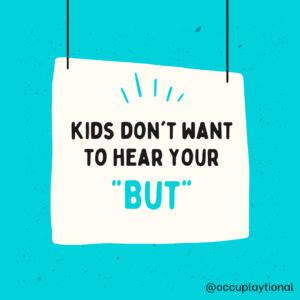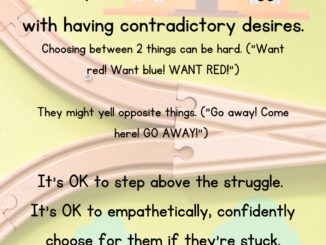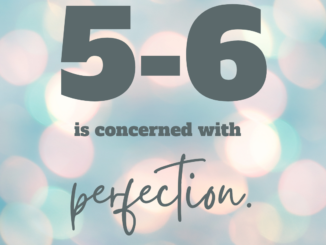
At home…
“I want Dad.”
“I know.” But Dad needed to take a break for a little while, so I’m going to play with you for right now.
“I need a Band-Aid.”
“I hear you, it hurts!” But a Band-Aid doesn’t actually do anything for your eyeball being itchy.
“I want to go downstairs.”
“Yeah, I understand.” But when we were downstairs, you were out of control hitting and kicking, so we’re going to sit together in your room for now.
At school…
“Don’t let anybody else use this toy.”
“I hear what you’re saying.” But the toys in my room are for everyone.
“I don’t want to go to lunch. I want to stay in your room.”
“I know.” But you have to, it’s your class’s lunchtime.
“I hate writing.”
“Oh?” But you have to finish this assignment.
***
All of these “buts” are something that plays in my head when I’m talking to children — my children that I’m the mom of, my children that I’m the OT of. All of them are something that I consciously bite back.
I’m not saying that I shut the conversation down and walk away. Sometimes when I suggest this, people start to get worried. “What if the child is actually asking you the question? What if your response is taken as being uninterested or noncommittal or blowing them off or…?”
I often still have more to say eventually. It’s just much more likely to be open, curious, empathetic, and compassionate if I stop myself from first sticking my “but” where it doesn’t belong.
The “but” immediately negates whatever it was I was just saying. No empathy or love or respect is retained; to them, it’s just another adult shutting down what they were trying to express, the emotion they were trying to share that they were feeling.
“I need a Band-Aid!”
“I know, it hurts! But a Band-Aid doesn’t actually fix your eyeball being itchy.”
“Ohh, thanks for the logic lesson! Wow, problem solved. Now my eye isn’t itchy and also I’ve learned a valuable lesson about the problem-solving capacities of Band-Aids. I feel like this really connected us!” …Said my child, absolutely never.
Instead, her internal monologue if I stick my “but” in there might be something more like… “You just don’t understand me!! I am having a problem and I need it to be solved!! I’m saying a solution and you’re just shooting it down!! Why don’t you want my problem to be fixed???”
***
Imagine a scenario like this:
You’ve been waiting to get a babysitter for ages. To finally get to go out, or just get some time to yourself. An hour before your agreed time, the babysitter calls you and cancels, explaining that they’re legitimately very sick with all kinds of contagious symptoms.
You’re soooooo disappointed and sad and hurt and let down. You lament to your partner or a friend about it and they say, “But you wouldn’t want the babysitter to get your kids sick.”
Like…yeah, of course there’s logic and explanation involved. And also, the logic and explanation is missing the point. The point of what you’re saying isn’t that you don’t understand why, the point of what you’re saying is that you’re sad and upset and disappointed anyway.
It’s the same for kids. Everybody just wants to be heard. And nobody feels heard when they’re talking to a “but”.



